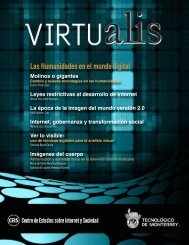P
terranova-network-culture
terranova-network-culture
- No tags were found...
You also want an ePaper? Increase the reach of your titles
YUMPU automatically turns print PDFs into web optimized ePapers that Google loves.
Three Propositions on Informational Cultures 25alternatives. Nothing new is really added, only some (im)probablealternatives eliminated (such as other modes of knowledge ormethods of analysis).The transmission of information concerns alternatives formulatedon the basis of known probabilities within the constraints set up bythe interplay of code and channel or medium. That is why the mosteffective and concise modality of information transmission todayis that of the opinion poll, the survey, risk assessment and all othertypes of information that can be easily encoded for survival in themeta-medium of an informational milieu. What is the probabilitythat I will develop a fatal disease if I keep smoking? How is thepopularity of the government doing today? How many points didthe Dow Jones lose today and what are the chances that it will go up?Is it by chance that there is a whole sector of the financial markets,such as that of futures, that is based on a kind of legal gamble on theprobable future? Whether it is marketing research, polls-informedpublic policy, or medical decisions, the transmission of informationinvolves the action of a code and a channel setting the limits withinwhich the problem can be presented and mapping out sets of possiblealternatives. The political technology of information societies iscrucially concerned with the organization of the field of the probableor the likely. It thus produces a sensibility to social change (andforms of subjectivity) that are informed by the relation between thereal and the possible – where the real is what remains while all othercompeting possibilities are excluded.Once again what we are presented with here is not simply theeffect of a technological organization of communication, but a setof relays between the technical and the social. The closure of thehorizon of radical transformations that is implied in the probabilisticnature of information and the code is not simply the effect ofinformation and communication technologies. On the contrary, itis once again a matter of techniques and impersonal strategies asthey distribute themselves on the macroscopic consensus about theultimate triumph of the existent. A cultural politics of informationthus also implies a renewed and intense struggle around thedefinition of the limits and alternatives that identify the potentialfor change and transformation. The cultural politics of information,as it unfolds across the distributed networks of communication,often involves a direct questioning of the codes and channels thatgenerate the distribution of probabilities – that is the production ofalternatives as such. It is exactly because all information assumes the








